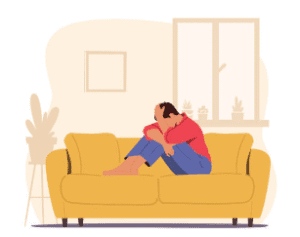Emotional trauma is an injury that affects not only our body but also our heart and mind. Whenever we go through a major emotional distress or stressful experience, it affects our daily lives, such as anxiety, depression, or emotional numbness.
But the good thing is that if you want to know how to recover from emotional trauma, it is possible. We just have to adopt some correct and practical methods in our daily lives.
In this blog, we will discuss simple and effective methods that will help you recover from emotional trauma step-by-step. Whether you are going through a painful experience or want to heal your emotional wounds, this guide is just for you.
Do you want to heal your mind and body from trauma? The Body Keeps the Score is a smash bestseller that teaches you how to truly recover. Get your copy here. Buy on Amazon
Problem statement
How to recover from emotional trauma. This is one such problem in which people are not able to recover from their emotional pain. Emotional trauma can increase depression, anxiety, and other problems in life.
People get confused about how to recover from emotional trauma and how to heal themselves. In this blog, you will learn what the effective ways to recover from emotional trauma.
1)How to recover from emotional trauma step by step

Acknowledge your feelings. Meaning accept your emotions; denial slows recovery.
Identify the signs. Mood swings, anxiety, or fear—whatever it is, recognize them so you can understand what stage you are at.
Seek professional help. A therapist or counselor can give you a safe space and healing tools.
Practice self-help techniques. Meaning you can also practice daily meditation, journaling, and gratitude. This speeds your recovery.
Rebuild positive connections. Spend time with a few supportive people who uplift you.
Focus on your physical health. A healthy diet, exercise, and proper sleep every day will improve your mental well-being.
Set those small recovery goals. Celebrate every small progress so that your motivation stays intact.
IF YOU ARE ALSO STRUGGLING WITH EMOTIONAL PAIN? Try Healing Wave – a 7-minute daily meditation backed by psychology and sound therapy that helps us to heal hidden traumas and restore inner peace.
2) Practical tips for healing deep emotional wounds
Deep emotional wounds require a great deal of self-compassion, tolerance, and time to heal. If you, like me, are genuinely learning how to recover from emotional trauma, then you just have to understand your emotions and accept them.
Here are some practical and proven tips that will help you in your emotional trauma journey.
1. The first step is to acknowledge your pain, which means to accept your emotions, no matter what they are. Ignoring or suppressing them will slow down your recovery.
2. Seek help from a professional. There is no weakness in seeking therapy or counseling. A trained therapist can guide you very well on how to heal emotional wounds effectively.
3. Create a self-care routine for yourself; invest time in journaling, meditation, yoga, or other creative hobbies. These activities will relax your mind and help you implement emotional recovery tips.
4. Set a healthy boundary for yourself. Creating distance from toxic relationships and situations is important. This protects your emotional energy and helps you overcome emotional pain easily.
5. Family and friends: Or do you have a support group? Share your thoughts and stories with them. Staying connected boosts your healing process and makes you feel like you’re not alone.
6. Start with small goals. Healing is not a process of 1 week or 10 days; it is a long-term process. Set small milestones for yourself, like adopting a healthy habit or breaking a negative thought pattern.
How to recover from emotional trauma is a journey. Every step brings you closer to your whole self. Never judge yourself, and keep one thing in mind that your past does not define your future happiness.
Recovering from emotional trauma takes patience. Practicing meditation for emotional healing can calm your mind and support your recovery.
3) Some signs that indicate you are suffering from emotional trauma
If you are genuinely learning how to recover from emotional trauma, then first, it is very important for you to understand that the symptoms of emotional trauma appear differently in every person, but there are some common signs that alert you about your mental and emotional health in advance. So let’s see.
1. Constant anxiety and fear
If you constantly feel uneasy, you feel such fear that there is no clear reason for it. You start thinking of worst-case scenarios in every situation.
2. Emotional numbness
You are unable to feel your emotions, as if your heart and mind are both disconnected. Sometimes you are happy, but that feeling does not go deep inside.
3. Overthinking and intrusive thoughts
Painful or traumatic events of the past keep repeating in your mind again and again. These intrusive thoughts prevent you from living in the present moment.
4. Mood swings and irritability
Your mood changes over small things. Sometimes you feel overly happy, then within a short time, you feel angry or sad.
5. Social withdrawal
You start keeping away from your friends, your family, or social gatherings. You feel that you will not be understood or that no one will understand you.
6. Physical symptoms
headache, issues with digestion, exhaustion, tense muscles, or trouble sleeping. These are all physical signs of your emotional stress.
If you are experiencing multiple of these signs, you should take it seriously. This tells you that you are in the phase of emotional trauma. At this point, you can begin your healing journey, which includes therapy, self-care, and the right mindset.
Remember, understanding and accepting it is the first step towards how to recover from emotional trauma.
4) How to recover from emotional trauma without losing hope

Recovering from emotional trauma is a challenging process, but it is not impossible. When we are hurt, whether it is due to a loss, a relationship, or a past experience.
At that time, we naturally feel hopeless. But this is the one moment when you have to make a commitment to yourself that now you will heal.
The following actions can help you:
1. Accept your emotions. Choosing to repress your feelings is the first step.
2. Seek therapy or talk to trusted friends and family. And yes, emotional trauma treatment is more effective with professional help.
3. Practice self-care. Don’t blame yourself. Try emotional trauma self-help techniques like meditation, journaling, and yes, mindful breathing, okay?
4. Focus on small wins per day. Celebrate small milestones in recovery. This will keep a sense of hope within you.
5. Stay physically active. You need to do exercise, yoga, or a morning walk; you need to improve both your mood and mental health.
6. Avoid your triggers. Stay away from situations or people that trigger past trauma until you feel mentally stable.
Just remember one thing that “how to recover from emotional trauma” does not just mean getting rid of the pain. It means becoming a better, stronger version of yourself. You are many times stronger than your pain, and your healing journey can become an inspiration for someone else as well.
5) What are natural ways to recover from emotional pain and find peace?
How to recover from emotional trauma is naturally possible if you follow a consistent and mindful approach. There are some proven steps here; let’s see.
1. First, understand and accept your emotions. True healing will only start after you have a better understanding of your emotional traumas.
2. When you meditate and do deep breathing daily, your emotional stress reduces, and your mind becomes peaceful.
3. Do daily exercise or yoga; this naturally releases feel-good hormones in the body, which reduces pain and anxiety within us.
4. Time spent in nature or peaceful solitude will calm your mind and bring emotional clarity within you.
5. Write down your feelings once or share them with a trusted friend. This process will help you a lot in releasing your emotions.
Be patient for some time after following these natural ways, and celebrate your progress. Though emotional healing takes time, with continuous work, you are going to feel stronger and more at ease with your difficulties.
6) Why is emotional trauma therapy life-changing?
Emotional trauma therapy plays a life-changing role because it gives you the right tools, the right guidance, and a safe space to trustingly heal from past emotional wounds.
When trauma happens to us—be it heartbreak, abuse, or the loss of a loved one—we carry a lot of emotional pain, fear, and anxiety beneath us.
Therapy teaches you step-by-step how to recover from emotional trauma in a way that feels safe and sustainable.
The biggest benefit of emotional trauma therapy is that it helps you:
1. Identify signs of emotional trauma that you may not even realize are affecting your daily life.
2. Learn effective emotional healing techniques such as journaling and deep breathing.
3. Break free from unhealthy coping mechanisms like isolation, overthinking, and negative self-talk.
4. Build emotional resilience so that future challenges don’t break you.
Through methods like an emotional trauma self-help exercise, psychological trauma recovery, and emotional trauma treatment plans, therapy teaches you to reframe your thoughts and, yes, release emotions in a healthy way.
It is not about coping; it’s about transforming your mindset and life and creating long-term emotional stability.
Start exploring how to recover from emotional trauma with the help of therapy. It could be the first step toward being healthier and stronger.
7) Self-help habits to recover from emotional wounds

Recovering from your emotional trauma can sometimes feel very challenging, but with the right self-help habits, you can effectively heal your heart. These habits not only uplift your mood, okay? They also help you with long-term emotional trauma healing.
Top self-help habits for emotional recovery
1. Do daily journaling. Write down your thoughts and feelings. This is a practice that will help you cope with emotional trauma; it helps you understand and process your emotions better.
2. Daily 10-20 minutes of meditation or deep breathing exercise will calm your mind and reduce your stress. Yes, emotional recovery tips are an effective natural method.
3. Regular exercise, your balanced diet, and proper sleep will improve your emotional balance. Yes, there is a science-backed method for ways to heal emotional pain.
4. Just talk to each other daily with love and encouraging things. You will replace your negative thoughts and feel confident in overcoming emotional pain. This is the best and a good trick. Try it once, and it will be much better in your life.
5. Share your pain and feelings with trusted friends, family, or professional counselors. Yeah, emotional trauma support is a critical step and also protects against isolation.
6. Learn to protect your emotional trauma support very well. Yeah, emotional trauma self-help is an important habit that saves you from toxic relationships.
7. Your hobbies and creative outlets. Painting, music, writing, or any other creative activity is a safe way to express your emotions; it is a fun and effective method of emotional trauma therapy.
8. Note down small blessings or achievements daily. This will shift your mindset and accelerate your healing process.
9. Do self-education. Meaning you can gain knowledge about your emotional health and recovery by reading books, podcasts, or blogs. Yeah, improving is your habit for recovering from past trauma.
Remember this, okay? Healing is a gradual process. Just be consistent by adopting small daily habits. If you follow these habits regularly, then your journey to recover from emotional trauma will become smooth and effective for you.
Frequently Asked Questions
1) What is emotional trauma?
Emotional trauma occurs when you experience any emotional or psychological injury, such as someone’s death, breakup, or abuse.
2) How to recover from emotional trauma?
To recover, first understand your emotions, take professional help, do self-care, and adopt meditation and positive habits.
3) How do we help ourselves with emotional trauma?
Journaling, meditation, talking to supportive people, and taking good care of your mental health are effective ways of self-help.
Conclusion: “Closing Note: Take the First Step Towards Emotional Recovery”
The process of how to recover from emotional trauma is like a long journey, in which you need patience, self-love, and a support system. In the beginning, you may feel that this pain will never end, but as you understand your emotions, express them, and work on your mental health, you will gradually start to feel light.
Celebrate small milestones along your healing journey—like going through a day without a painful memory, or enjoying a favorite activity again.
Getting therapy or talking to a trusted friend/family member can give you strength. Self-care activities, such as meditation, journaling, walking in nature, or engaging in hobbies, help bring your mind into balance.
The most important thing is to never put the blame on yourself and never compare your recovery to anyone else. And yes, each person’s healing process is unique. Your story can be proof of your strength, and one day, when you look back, you will realize how strong you have become.
You can also read about: recovering from emotional trauma.
“Take the First Step to Recover from Emotional Trauma”
“If you’re wondering how to recover from emotional trauma, remember—healing is a journey, in which your patience and self-love are most important.
Accept your emotions, take small steps, and follow the tips in this guide.
Share your experience in the comments; maybe your story will become an inspiration for someone else.
Remember, time alone doesn’t heal emotional wounds—the right guidance does. This bestselling book has helped thousands of people overcome trauma and find happiness again. Now it’s your turn. Order your copy now and take the first real step toward lasting healing.